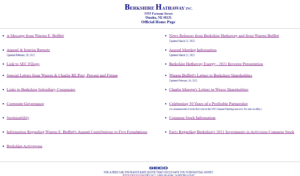
The full-text collection is here: 21.07.13 Warren Buffett On Inflation & Insurance (Collect 1977-2008)
21.07.13 Warren Buffett On Inflation, Business, & Insurance (Collect 1977-2008)
Leo: an extract/collection of WB’s opinion on Inflation & Insurance from 1977 until 2008, mostly from his letters to shareholders.
Inflation is such a powerful force affecting the efficiency & effectiveness of a business – the best business leaders should be skillful in deploying capital.
—- Some quote —-
***
Corporate America cannot increase earnings by desire or decree. To raise that return on equity, corporations would need at least one of the following:
(1) an increase in turnover, i.e., in the ratio between sales and
total assets employed in the business;
(2) cheaper leverage;
(3) more leverage;
(4) lower income taxes;
(5) wider operating margins on sales.
High rates of inflation generally cause borrowing to become dearer, not cheaper
An irony of inflation-induced financial requirements is that the highly profitable companies – generally the best credits – require relatively little debt capital.
Recent statistical evidence, furthermore, does not inspire confidence in the proposition
that margins will widen in a period of inflation.
If a business was able to base its prices on replacement costs, margins would widen in inflationary periods. But the simple fact is that most large businesses, despite a widespread belief in their market power, just don’t manage to pull it off.
Your future results will be governed by three variables: the relationship between book value and market value, the tax rate, and the inflation rate.
***
[Leo] Pha loãng hoặc chia cổ tức bằng cổ phiếu là 1 cách để nói rằng công ty không còn tiền hoặc là cổ phiếu thì rẻ hơn cả tiền.
And why does a man [WB] who is gloomy about stocks own so much stock? “Partly, it’s habit,” he admits. “Partly, it’s just that stocks mean business, and owning businesses is much more interesting than owning gold or farmland. Besides, stocks are probably still the best of all the poor alternatives in an era of inflation – at least they are if you buy in an appropriate price.“
***
You will not be right simply because a large number of people momentarily agree with you. You will not be right simply because important people agree with you. In many quarters the simultaneous occurrence of the two above factors is enough to make a course of action meet the test of conservatism. You will be right, over the course of many transactions, if your hypotheses are correct, your facts are correct, and your reasoning is correct. True conservatism is only possible through knowledge and reason
*****
It was a mistake to buy fifteen-year bonds, and yet we did; we made an even more serious mistake in not selling them (at losses, if necessary) when our present views began to crystallize.
*****
For capital to be truly indexed, return on equity must rise, i.e., business earnings consistently must increase in proportion to the increase in the price level without any
*****
Need for the business to add to capital – including working capital – employed. (Increased earnings produced by increased investment don’t count.) Only a few businesses come close to exhibiting this ability.
*****
When prices continuously rise, the “bad” business must retain every nickel that it can. Not because it is attractive as a repository for equity capital, but precisely because it is so unattractive, the low-return business must follow a high retention policy
—
(for) Inflation acts as a gigantic corporate tapeworm. That tapeworm preemptively consumes its requisite daily diet of investment dollars regardless of the health of the host organism. → Leo: This is why investing in low CAPEX (to grow) is important.
The future profitability of the industry will be determined by current competitive characteristics, not past ones.
***
Businesses needing little in the way of tangible assets simply are hurt the least.
And that fact, of course, has been hard for many people to grasp. For years the traditional
wisdom – long on tradition, short on wisdom – held that inflation protection was best
provided by businesses laden with natural resources, plants and machinery, or other
tangible assets (“In Goods We Trust”). It doesn’t work that way. Asset-heavy businesses
generally earn low rates of return – rates that often barely provide enough capital to fund
the inflationary needs of the existing business, with nothing left over for real growth, for
distribution to owners, or for acquisition of new businesses.
In contrast, a disproportionate number of the great business fortunes built up during the
inflationary years arose from ownership of operations that combined intangibles of
lasting value with relatively minor requirements for tangible assets. In such cases
earnings have bounded upward in nominal dollars, and these dollars have been largely
available for the acquisition of additional businesses. This phenomenon has been
particularly evident in the communications business. That business has required little in
the way of tangible investment – yet its franchises have endured. During inflation,
Goodwill is the gift that keeps giving
→ [Leo] Still about low CAPEX
*** Dividend Policy ***
We believe managers and owners should think hard about the circumstances under which earnings should be retained and under which they should be distributed.
The first point to understand is that all earnings are not created equal. In many businesses particularly those that have high asset/profit ratios – inflation causes some or all of the reported earnings to become ersatz. (thế phẩm)
The ersatz portion – let’s call these earnings “restricted” – cannot if the business is to retain its economic position, be distributed as dividends. Were these earnings to be paid out, the business would lose ground in one or more of the following areas: its ability to maintain its unit volume of sales, its long-term competitive position, its financial strength.
No matter how conservative its payout ratio,a company that consistently distributes restricted earnings is destined for oblivion unless equity capital is otherwise infused.
Unrestricted earnings should be retained only when there is a reasonable prospect – backed preferably by historical evidence or, when appropriate, by a thoughtful analysis of the future – that for every dollar retained by the corporation, at least one dollar of market value will be created for owners. This will happen only if the capital retained produces incremental earnings equal to, or above, those generally available to investors.
***
Managers of high-return businesses who consistently employ much of the cash thrown off by those businesses in other ventures with low returns should be held to account for those allocation decisions, regardless of how profitable the overall enterprise is.
***
Pricing behavior in the insurance industry continues to be exactly what can be expected in a commodity-type business
Today [1987], social and judicial inflation are the major culprits; the cost of
entering a courtroom has simply ballooned. Part of the jump in cost arises from
skyrocketing verdicts, and part from the tendency of judges and juries to expand the
coverage of insurance policies beyond that contemplated by the insurer when the policies
were written. Seeing no let-up in either trend, we continue to believe that the industry’s
revenues must grow at about 10% annually for it to just hold its own in terms of
profitability, even though general inflation may be running at a considerably lower rate.
***
Berkshire’s earnings come from many diverse and well-entrenched businesses; these businesses seldom require much capital investment; what debt we have is structured well; and we maintain major holdings of liquid assets.
A business obtains the best financial results possible by managing both sides of its balance
sheet well. This means obtaining the highest-possible return on assets and the lowest possible cost on liabilities.
***
In our opinion, the real risk that an investor must assess is whether his aggregate after-tax receipts from an investment (including those he receives on sale) will, over his prospective holding period, give him at least as much purchasing power as he had to begin with, plus a modest rate of interest on that initial stake.
If we have a strength, it is in recognizing when we are operating well within our circle of competence and when we are approaching the perimeter.
***
If the choice is between a questionable business at a comfortable price or a comfortable business at a questionable price, we much prefer the latter. What really gets our attention, however, is a comfortable business at a comfortable price.
Our reservations about the prices of securities we own apply also to the general level of equity prices. We have never attempted to forecast what the stock market is going to do in the next month or the next year, and we are not trying to do that now.
Charlie and I look for companies that have
- a) a business we understand;
- b) favorable long-term economics;
- c) able and trustworthy management; and
- d) a sensible price tag.
A truly great business must have an enduring “moat” that protects excellent returns on
invested capital. The dynamics of capitalism guarantee that competitors will repeatedly
assault any business “castle” that is earning high returns. Therefore a formidable barrier
such as a company’s being the low cost producer (GEICO, Costco) or possessing a
powerful world-wide brand (Coca-Cola, Gillette, American Express) is essential for
sustained success. Business history is filled with “Roman Candles,” companies whose
moats proved illusory and were soon crossed.
A moat that must be continuously rebuilt will eventually be no moat at all.
Long-term competitive advantage in a stable industry is what we seek in a business. If
that comes with rapid organic growth, great. But even without organic growth, such a
business is rewarding. We will simply take the lush earnings of the business and use them
to buy similar businesses elsewhere. There’s no rule that you have to invest money where
you’ve earned it. Indeed, it’s often a mistake to do so: Truly great businesses, earning
huge returns on tangible assets, can’t for any extended period reinvest a large portion of
their earnings internally at high rates of return.


